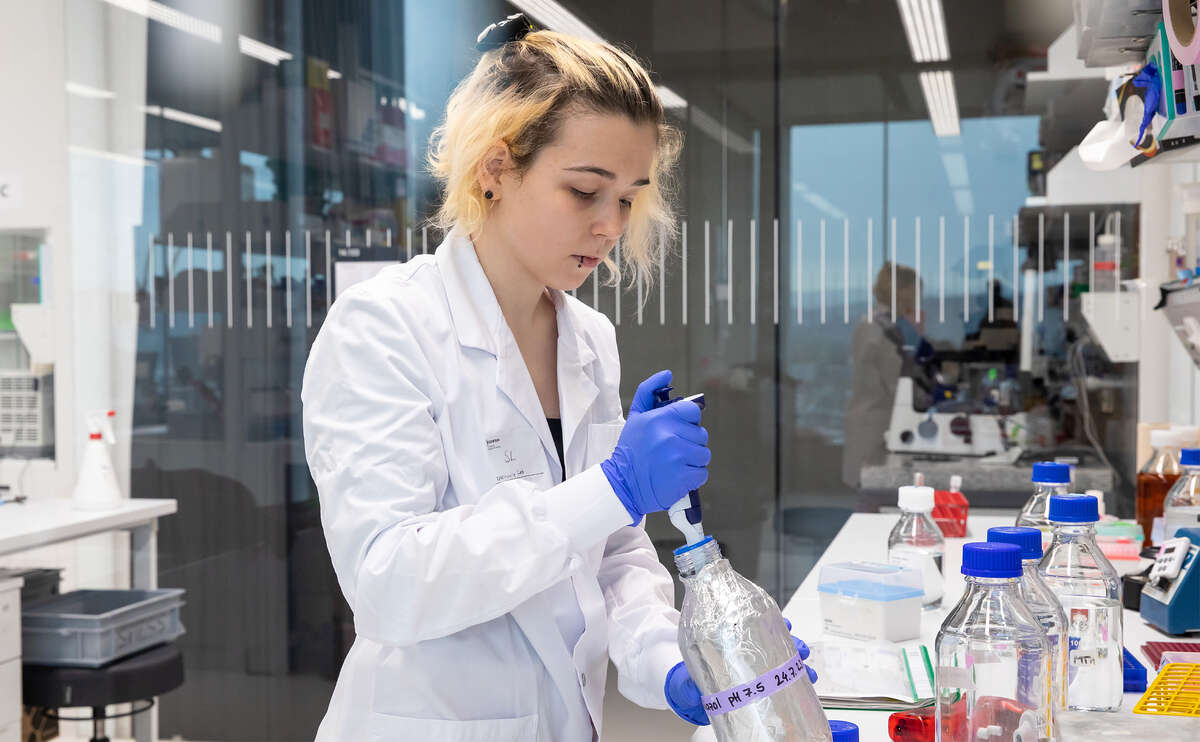Interview with Seraphine Lüscher
She practically adopted the protein assigned to her in the Experimental Molecular Biology course. Being able to conduct experiments from A to Z already in her second year of studies was a thrill for her. For Seraphine, the course was the highlight of her bachelor's degree. But she also found the diversity of topics in the block courses enriching. They also help you discover which research direction you are drawn to.

Why did you decide to study biology?
Originally, I wanted to become a pastry chef after finishing high school, doing something hands-on and creative. However, I quickly realized that I missed the intellectual challenge. Eventually, I chose biology. The broad spectrum of areas has always fascinated me, and it gives you the opportunity to keep discovering new things without ever running out of questions.
How was the start? In the beginning, there's a lot of theory with math, physics, and chemistry.
The first semesters can be a bit of a struggle. It's a bit of an acid test. But by the third year at the latest, when you start specializing, you know it was worth it.
In the first years, you can also take elective courses. What did you choose?
I think it's important to expand your horizons and not just associate with scientists. That's why I attended lectures in Gender Studies and Psychology. An exception was Forensic Genetics, which is very exciting and practical.
How did you experience the Experimental Molecular Biology course (EMB) in your second year?
I think that was the best time of my studies. We grew close as a group, and the atmosphere was very familiar. Since the course lasts the entire year, you can really carry out experiments from start to finish. Things are a little different in the block courses. Since they are more limited in time and you cover a lot of different topics, you often only look at one aspect of an experiment. In the EMB, we were divided into groups. Each group was given a specific protein about which not much was known. In contrast to the block courses, here you could take responsibility for your own project and actually discover something new. I enjoyed that very much and it also reflects the reality of what it is like to do a masters.
In the EMB, you also learn the basics of lab work.
Yes, we pipetted, poured gels, worked with cell cultures, transformed bacteria, cloned, and imaged. A little bit of everything. It was also very nice to work with the experts from the Imaging and Proteomics Core Facilities. Also a great preparation for the masters or a scientific career in general were the research presentations and the reading of scientific publications that we then presented in the journal clubs.
What did you like about the six-week block courses?
You delve into a lot of different topics, which makes it very diverse. One day you work with a mouse brain and on another with stem cells. You start to figure out in which area you'd like to do research in the next 1 ½ years. You also get to know numerous techniques in more detail. Even if I'm not using all of them at the moment, I'm glad to have them in my toolkit because I might come across a problem and then think, "Oh yes, I remember there was something like this or that."
How is the team spirit among the students?
I find it very good. Even now in the Master's program, I'm still in touch with many people from the block courses. Since many are doing their masters at the Biozentrum, you often run into each other unexpectedly during lunch or at the coffee machine. And the tutors from the block courses are very committed and, when the opportunity arises, ask you how you're doing and what you're up to. I find that very nice on a personal level.
You've just started your masters. How did you choose your topic?
I went to the Biozentrum website to find out which research group is working on which topic. That's where I came across Maria Hondele and her research on RNA and membraneless organelles. During my studies, I could never really dive deeply into these topics, and from my point of view, it’s a research area with great potential. So, I approached Maria at the Research Bazar. This is an event for bachelor students where group leaders first introduce themselves and then are available for questions during an apero. You should definitely take advantage of this opportunity. The conversation with Maria was very pleasant and I immediately felt comfortable in her team, so I'm very much looking forward to the next 1 ½ years.
Do you have any advice for new students?
Don't give up. The beginning can be a bit dry, but if you feel that it's the right path, stick to it! It also helps to talk to other students and realize that you're not alone. And It's also important to find a healthy balance. Of course, you could always keep on learning or set up another experiment. But I have to resist that temptation and tell myself that I owe it to my experiment to come back well-rested, so I then enjoy going for a jog.


